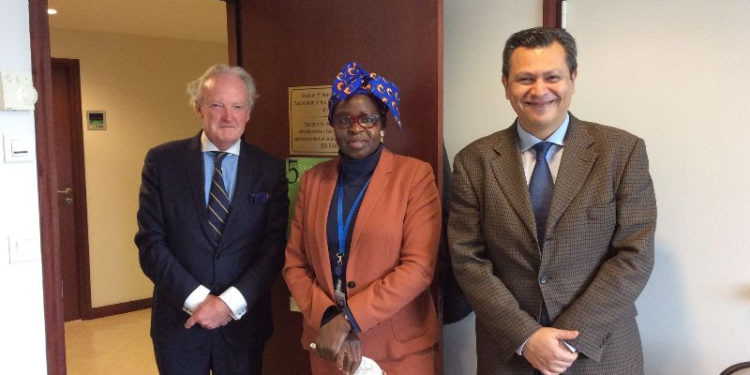Before UNESCO began its Easter period recess, St. Kitts and Nevis was rallying experts on the ground at its Paris Headoffice to secure this specialised UN agency’s expertise and assistance in contributing to the Federation’s development strategy in the fields of education and science.
On the heels of the submission to UNESCO of five substantive technical assistance projects by the St. Kitts and Nevis National Commission for UNESCO, the Federation’s Permanent Delegate, Ambassador Dr. David P. Doyle, met with the key UNESCO policy officers to discuss the various projects. These encompassed, amongst others, professionalising the teaching staff, accreditation of high-level qualifications, a water aquifer project and a game-changing initiative to transform the Cayon-based biosphere reserve into a plastic-free zone
Explained Ms Dorothy Warner, Secretary-General of the St. Kitts and Nevis National Commission for UNESCO: “The National Commission formulated five distinct projects under the UNESCO biennial Participation Programme. These were submitted to solicit technical assistance aid of up to US$26,000 per project. Under this Programme, UNESCO provides assistance to its Member States in the Organization’s fields of competence, covering education, Natural Science, Social Science, Culture, Communication and Information”.
Ambassador Doyle added: “As a small island developing state, the Federation has greatly benefited over the past decade from this UNESCO assistance Programme in many areas of its competence”
Ambassador Doyle met with the UNESCO Section for Teacher Development to elaborate the Federation’s next phase of the national professionalization of the teaching force, following two intense years of intervention by UNESCO on the project, led by the Ministry of Education.
The Federation now seeks UNESCO guidance on the development of a National Teacher Qualification Framework to guide teacher recruitment, the design and development of a national teacher education curriculum framework for
pre-service teacher education and not-in-service professional development programmes. This will cover professional teachers across the entire education system of St. Kitts and Nevis, accompanied by guidelines, frameworks and standards for the accreditation of Teacher Education Programmes and Continuous Professional
Development Programmes, all falling under the auspices of a new National Teachers Council.
Parallel discussions were pursued with Chief of the Section for Higher Education at the UNESCO Headquarters on strengthening the Federation’s national accreditation framework for reviewing and approving high-level qualifications in the post-secondary sector. It also includes the drafting of a legislative framework with policies and procedures to be followed by the reformed Accreditation Board, covering accreditation policies, registrations and accreditation, all linked to what Hon. Jonel Powell, Minister of Education, Sport, Youth Empowerment and Culture, described
“our labour needs”. Added the Minister: “Our new accreditation framework needs to be increasingly linked to the country’s development strategy, which makes this UNESCO educational accreditation input so critical in linking our youth to training that offers future job opportunities “.
In the field of science, two distinct UNESCO projects were presented by the National Commission, of which one related to optimizing the use of natural catchments and aquifers to enhance the availability of freshwater in St. Kitts and Nevis. This project, pioneered by Dr. Leighton Naraine, Director of Programme development at the Clarence Fitzroy Bryant College, will develop a methodology to collect vital data via field measurements of incoming rainfall to determine the adequacy of input to the hydrological cycle in St. Kitts and Nevis, in terms of discharge of water from runoffs, water loss from evapo-transpiration and field capacity for storage.
Noted Ambassador Doyle: “This would be an important contribution to the challenges we face in St. Kitts and Nevis, and indeed across the Caribbean, of limited availability of freshwater, accentuated by increased salinity, resulting in contamination, due to rising sea-levels”
The second science-related project submitted by St. Kitts and Nevis related to the existing UNESCO-accredited St. Marys’ Man and Biosphere (MAB) site in Cayon, which is actively exploring the feasibility of transforming the protected site into a plastic-free zone, with UNESCO expertise. Ms Telca Wallace, key coordinator of the recently completed clean-up and beautification exercise at St. Mary’s Man & Biosphere, and closely associated with the site since its inscription on the UNESCO MAB List in 2011, views the exercise as a means to sensitize citizens about, and eliminate the use of, single-use plastics in the MAB site. Stated Ms Wallace: “As the first Biosphere Reserve in the English-speaking Caribbean, we now seek to scale-up
our ambitions to remove plastic pollution, whether on land or as marine debris associated with St. Marys by galvanising the wider St. Kitts and Nevis stakeholders in raising the awareness of the adverse aspects of single-use plastics. From there we seek change to the MAB community and wider general public attitude towards this ambition”.
Noted Ambassador Doyle: “A central and core targeted activity of this project, is the hosting by the Minister Powell of a major stakeholder conference to articulate and refine the nature of this MAB plastics-free project and map out a series of tangible steps to obtain approval by, and active participation of, all parties”. This will embrace ministries, NGOs, MAB members, the turtle monitoring network, the youth, local St. Mary’s municipal authority, private industry and public utility agencies associated with distribution of water.
Following Ambassador Doyle’s briefing with Minister Powell, the latter remarked: “St. Kitts and Nevis continues to rely on the specialised expertise of UNESCO, especially in deploying high-level experts with small island developing state exposure, and accompany us in adopting best-practice policies in education and science”.
St. Kitts and Nevis is also pursuing negotiations with UNESCO to integrate education for sustainable development (ESD) into the national curriculum and the inception of a separate phase-two project designed to develop a dedicated intangible cultural heritage (ICH) policy framework. The identification of specific twin-island ICH elements for listing on the UNESCO ICH Register will also be part of the plans going forward.

